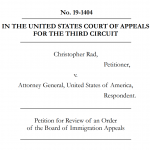
Domain Name Registrar Isn’t Liable for Hijacked Domain Name–Rigsby v. GoDaddy
Rigsby registered the scottrigsbyfoundation.org domain name via GoDaddy. He claims GoDaddy didn’t give him proper notice of renewal, so the domain name lapsed. It was then registered by an interloper who displays gambling-related material. Rigsby asked GoDaddy to give him…

Want to Engage in Anti-Competitive Trademark Bullying? Second Circuit Says: Great, Have a Nice Day!–1-800 Contacts v. FTC
Starting in the mid-2000s, 1-800 Contacts sought to control how its competitors bought search engine advertising triggered by its (so-called) trademarks, a process I call competitive keyword advertising. To do this, 1-800 Contacts typically sued its competitors and then quickly…

Print Ad’s “Terms and Conditions” Don’t Create Binding Arbitration Clause–Soliman v. Subway
Subway ran a promotion offering deals if customers signed up for text messages. The stores displayed the following print ad: The language in the bottom right: Limited Time Only. Message and data rates may apply. Max10msgs/mo-Msgs may be autodialed from…
Facebook’s “Russia State-Controlled Media” Disclosure Doesn’t Violate the Lanham Act–Maffick v. Facebook
Maffick runs several Facebook pages. Due to Maffick’s possible ties to the Russian government, Facebook labeled the pages “Russia state-controlled media.” Maffick sued Facebook. In Sept. 2020, the court denied Maffick’s TRO request. Now, the court has dismissed the Lanham…

YouTube (Again) Defeats Lawsuit Over Content Removal–Lewis v. Google
Lewis ran a YouTube channel, “Misandry Today.” (Misandry = hatred of men). He claims YouTube removed or demonetized some of his videos. The district court rejected his lawsuit. In a short unpublished memo opinion that basically echoes the district court’s…

Internet Feuds Are Basically Defamation-Free Warzones–Rapaport v. Barstool
[WARNING: this post contains coarser-than-usual content.] This case involves actor Michael Rapaport, who has appeared in many popular TV shows and movies. Apparently he’s edgy in real life, which he demonstrated through a CBS Radio show. Barstool Productions “has cultivated…

Comments on the PROMISE Act
Senators Lee, Braun, and Moran introduced the “Promoting Responsibility Over Moderation In the Social-media Environment Act,” the “PROMISE Act.” (It’s a reintroduction of S. 4975 from last session). This is a transparency-focused bill that partially overlaps with last year’s PACT…

Section 230 Covers Republication of Old Yearbooks–Callahan v. Ancestry
Ancestry.com publishes 450,000 old yearbooks in the form of 730M records that contain, at least, “the person’s name, photograph, school name, yearbook year, and city or town (at the time of the yearbook).” Ancestry doesn’t disclose how it acquires the…

Section 230 Protects App Store from Liability for Apps With Loot Boxes–Coffee v. Google
Many video games have loot boxes, where players can exchange valuable consideration (like in-game currency purchased for cash) for a chance to win something really valuable to gameplay. Because loot boxes may involve chance, consideration, and prizes, loot boxes may…

CAN-SPAM Requires Falsity or Deception, But What Do Those Words Mean?–Rad v. US
This is an unusual federal appellate ruling interpreting CAN-SPAM because it came to the court from the Board of Immigration Appeals. Rad was tried and convicted of violating CAN-SPAM. The Third Circuit affirmed his conviction in 2014. Rad was a…
